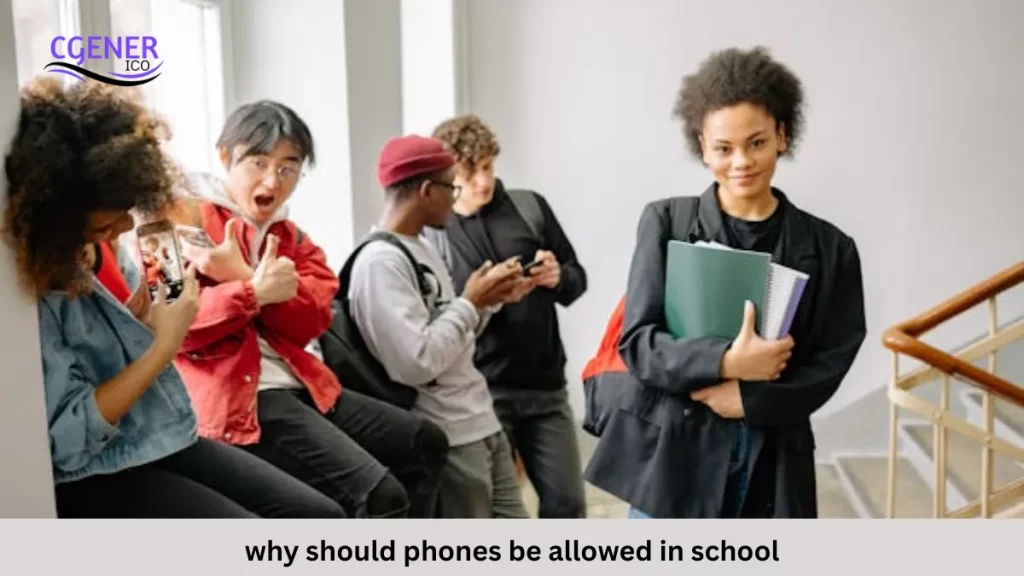Table of Contents
Why should phones be allowed in school? This is a question many students, parents, and teachers ask. In a world where technology is everywhere, phones play a significant role in connecting and learning. Allowing phones in schools could open new opportunities for students to engage, learn, and explore in ways that weren’t possible before. Let’s dive into some clear reasons why schools should consider allowing phones.
Benefits and Drawbacks of Allowing Phones in School
Here are some advantages of allowing phones in schools:
- Enhanced learning opportunities
- Support for collaboration and group work
- Added safety during emergencies
But there are a few drawbacks to take into account as well:
- Increased distractions
- Risk of cheating on assignments
- Potential social and emotional challenges
Deciding whether to allow phones in schools requires careful consideration. For parents and teachers, it’s essential to weigh both the benefits and drawbacks, with open discussions helping guide the final decision.
11 Reasons to Allow Cell Phones in Schools
1-Promotes Learning Anytime, Anywhere
why should phones be allowed in school? Phones are powerful tools for learning. Imagine having access to answers right in your pocket. When students use their phones, they can look up facts, read books, or watch educational videos whenever needed. This helps them learn faster, gives them control over their learning pace, and makes learning possible anytime. Phones can turn the classroom into a world of knowledge, sparking curiosity and keeping students interested in learning.
2-Easy Access to Information
Today, students don’t need to rely only on textbooks. With phones, they have the internet, which is full of up-to-date information. This access means students can look up discoveries, current events, or answers to questions during class. They can go beyond their textbooks to understand the topics more deeply. Allowing phones in school makes it easier to keep up with fast-changing information and find what they need quickly and effectively.
3-Encourages Responsible Technology Use

why should phones be allowed in school? Letting students use phones in school can teach them how to use technology responsibly. Schools are a safe place to learn subjects and life skills. When phones are allowed in school, teachers can guide students on when, where, and how to use them appropriately. This practice helps students build healthy phone habits, which they’ll need outside of school. Learning responsible phone use is a skill that can last a lifetime.
4-Building Responsible Digital Citizenship
Incorporating phone usage into the classroom helps students learn healthy digital boundaries and establishes positive screen time habits they can carry beyond school. By setting specific times for phone use on campus, students learn to view their phones as helpful tools rather than something they rely on constantly.
5-Ensuring Safety and Preparedness

why should phones be allowed in school? Keeping students safe is always a top priority for faculty. With phones, students can stay connected to their parents anytime and communicate with peers during breaks, providing reassurance. Additionally, digital tools like anti-fraud hall passes and digital student ID cards are now accessible on students’ devices, enhancing security throughout the school day.
6-Helps in Organization and Time Management
Students can keep organized with the help of built-in functions on their phones. Students can stay on top of their assignments, tests, and projects by using calendars, reminders, and to-do lists. With these tools, students can set reminders for important deadlines or keep track of their progress on tasks. Having phones in school makes it easier for students to learn how to manage their time and responsibilities, a valuable skill for future success.
7-Boosts Engagement and Interest in Learning

Students often become more engaged When they can use phones for class projects. Using phones can make class discussions, research projects, and even group work more exciting. Students love using technology, and when it’s a part of their school life, they are more likely to feel connected to what they are learning. This engagement can lead to better grades, more participation, and a deeper understanding of the topics being taught.
Also Read: Why Should Phones Be Allowed in School? Here’s the Answer!
8-Prepares Students for the Digital Future

In today’s world, digital skills are essential. Allowing phones in school can help students get comfortable with technology and prepare them for the future. From using apps to finding information online, students can pick up abilities that can help them in their jobs and everyday lives. Allowing phones in school can give students a head start on becoming tech-savvy and ready for a digital world.
Also Read: CBT Technique Communicat: Unlocking Secrets to Empower Your Voice
9-Enhancing Collaboration in Group Work
Allowing cell phones on high school campuses supports group work in the classroom, primarily when multiple groups work toward different goals.
10-Capturing Memories and Enjoying Moments

Allowing phones on middle and high school campuses will enable students to capture memories and strengthen friendships, helping them create a positive school experience they look forward to each day.
Also Read: 1920’s Men’s Style: Unveil the Timeless Charm and Dapper Secrets
11-Facilitates Communication in Emergencies
Phones can be a lifeline during emergencies. If a pupil needs to get in touch with their parents or if there’s a need to send an alert to the whole school, phones can make this communication happen instantly. When schools allow phones, students and parents can feel safer knowing there’s a way to reach each other if needed. This helps everyone feel more secure and prepared for unexpected events.
Allowing phones in school could be a big step toward creating a modern, engaging, and prepared learning environment. From improving learning to preparing students for the digital age, the benefits of having phones in schools are clear. By guiding students on proper phone use, schools can help build a future where students are responsible, informed, and ready for anything. So, Why, then, should cell phones be permitted in schools? The answer lies in how they can support and enhance learning for every student.

